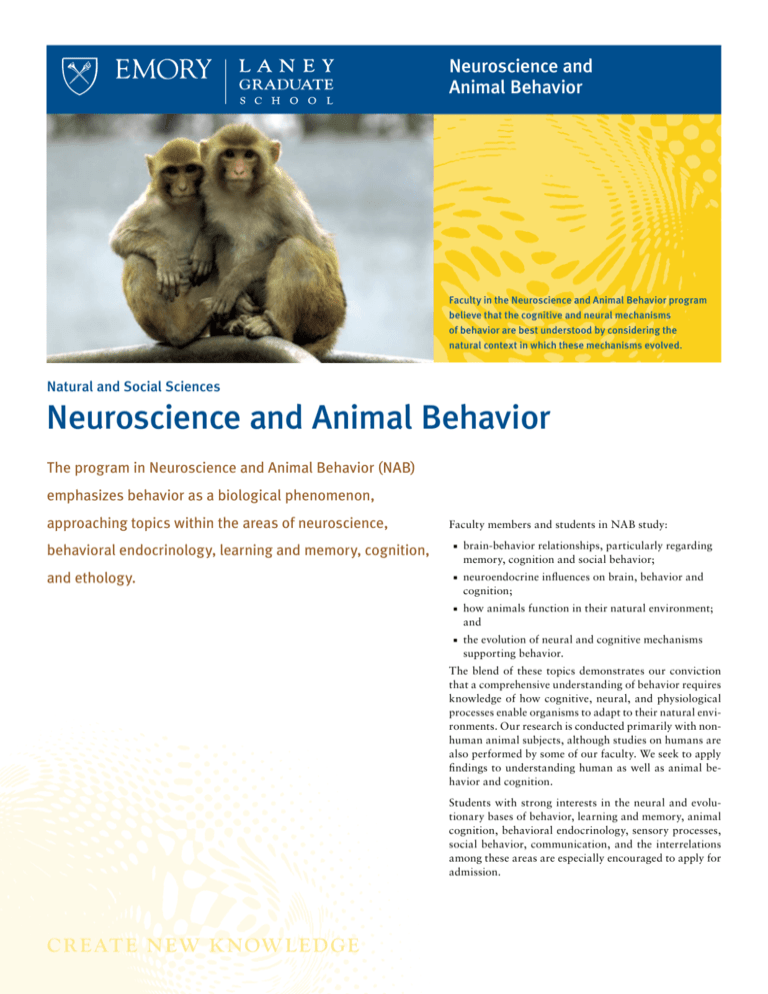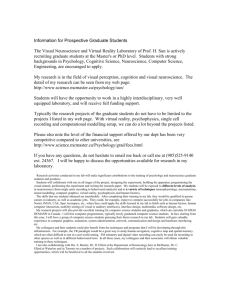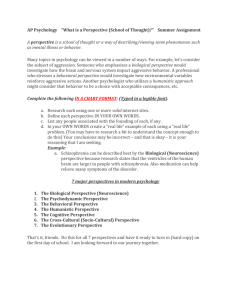Neuroscience and Animal Behavior
advertisement

Neuroscience and Animal Behavior Faculty in the Neuroscience and Animal Behavior program believe that the cognitive and neural mechanisms of behavior are best understood by considering the natural context in which these mechanisms evolved. Natural and Social Sciences Neuroscience and Animal Behavior The program in Neuroscience and Animal Behavior (NAB) emphasizes behavior as a biological phenomenon, approaching topics within the areas of neuroscience, Faculty members and students in NAB study: behavioral endocrinology, learning and memory, cognition, brain-behavior relationships, particularly regarding memory, cognition and social behavior; and ethology. neuroendocrine influences on brain, behavior and cognition; how animals function in their natural environment; and the evolution of neural and cognitive mechanisms supporting behavior. The blend of these topics demonstrates our conviction that a comprehensive understanding of behavior requires knowledge of how cognitive, neural, and physiological processes enable organisms to adapt to their natural environments. Our research is conducted primarily with nonhuman animal subjects, although studies on humans are also performed by some of our faculty. We seek to apply findings to understanding human as well as animal behavior and cognition. Students with strong interests in the neural and evolutionary bases of behavior, learning and memory, animal cognition, behavioral endocrinology, sensory processes, social behavior, communication, and the interrelations among these areas are especially encouraged to apply for admission. C R E AT E N E W K NOW LEDGE NEUROSCIENCE AND ANIMAL BEHAVIOR Research Environment Our students conduct their research in laboratories, in semi-natural settings, and in the field. Students are engaged in research starting in their first year and throughout their entire period of residence. We employ a mentor model of student recruitment in which students join a specific laboratory. Before you apply, please contact faculty whose work interests you. Emory’s Thriving Research Community Faculty and students in our program collaborate with researchers at a host of centers and institutions at Emory and beyond. Among them are: The Yerkes National Primate Research Center is one of nine National Institutes of Health-designated national primate research centers. Yerkes maintains a 115 acre field station that is home to almost 2000 monkeys and apes housed in semi-natural social groups. Yerkes is also home to the Living Links Center , a group of researchers studying human evolution by investigating our close genetic, anatomical, cognitive, and behavioral similarities with great apes. The Center for Behavioral Neuroscience (CBN), a National Science Foundation Science and Technology Center, is an award-winning, interdisciplinary research consortium composed of more than 100 neuroscientists spanning seven institutions in the metro Atlanta area. The Department of Psychiatry and Behavioral Sciences at the Emory School of Medicine is home to a number of research programs that intersect with the work of NAB faculty. These programs focus on the neural mechanisms underlying behavioral phenomena such as fear and affiliation. Emory’s GDBBS GRADUATE NEUROSCIENCE PROGRAM has about 40 faculty members who conduct research in areas of behavioral neuroscience. Most NAB faculty hold joint appointments in the Neuroscience Graduate Program as well as NAB. Students may apply to both programs, and matriculation into one program does not preclude taking courses offered by the other. NEUROIMAGING Emory has state-of-the art facilities for neuroimaging in humans, non-human primates, and small animals. Each facility is located in close proximity to NAB laboratories. Facilities The Department of Psychology occupies a 100,000 sq ft building that facilitates teaching as well as interaction among faculty and students. The five-story building is part of a Science Commons, located adjacent to Atwood Hall (chemistry) and across the street from from the Mathematics and Science Center. Our primary research facilities are the laboratories of the NAB faculty, located in the recently built Psychology building, in the O. Wayne Rollins Research Center and at the Yerkes National Primate Research Center’s Main Station. Research on social groups of primates is conducted at the Yerkes Field Station, about 30 miles from the Emory campus. Colloquia and Seminars A multitude of seminar series on campus provide opportunities for students to interact with eminent researchers both from outside and within Emory. The Psychology Department’s Colloquium Series brings in scientists who are leaders in their fields to present their work to our department and to interact with our graduate students during two-day visits. Comparable series are hosted by Yerkes, the Center for Behavioral Neuroscience, and the Neuroscience Program. Curriculum Coursework NAB students develop a course of study in consultation with their research advisers to tailor their curriculum to their individual interests and gain a basic foundation in psychological and neural science. NAB students take four core classes, which survey the fields of neuroscience and animal behavior, and a department-wide statistics course. Elective courses typically include topical seminars taught by NAB faculty on focal research areas as well as advanced courses in psychology, neuroscience, genetics, biology, anthropology, or philosophy. This curriculum encourages students to acquire breadth of understanding as well as to develop expertise and in-depth training in their chosen area of specialty. NAB students are eligible to apply to federally-funded T32 training programs in Mechanisms of Learning or Computational Neuroscience, which include curricula tailored to those research areas. NAB laboratories in the O. Wayne Rollins Building have facilities to support studies using electrophysiology, histology, molecular biology, and cognitive testing of small animals. Research Research is the centerpiece of graduate training in the NAB program. Although our students and faculty engage in diverse NEUROSCIENCE AND ANIMAL BEHAVIOR research, our shared interest in the mechanisms of behavior sets us apart from other graduate programs of comparable scope. Most of our students participate in a variety of research projects during their tenure in the program. Formal research requirements include a comprehensive review paper, a qualifying exam, and proposing, writing and defending both a master’s thesis and a dissertation. As researchers we must also communicate our results to others in the field and beyond. An important component of our training is the weekly NAB Research Seminar in which all students and faculty participate. In the Research Seminar, faculty, students, and outside investigators present research, discuss central issues and controversies in their fields, and explore practical topics related to careers in science. A primary goal of the Research Seminar is to provide students a structured opportunity to formally present their work and ideas in a supportive atmosphere. We strongly encourage students to attend and present their research at national and international meetings, and financial support is available to defray expenses. Training in Teaching Training in teaching is based on the Teaching Assistant Training and Teaching Opportunity (TATTO) Program, administered by the Laney Graduate School. The program provides a mentored introduction to teaching, where students assume progressively greater responsibilities. Training includes a two day teacher training course, with faculty drawn from across the University, and a Psychology teaching practicum, which supports students as they begin their first teaching experiences. Students typically complete two teaching assistantships for undergraduate courses such as introductory psychology or statistics, and a teaching associateship, with greater responsibilities, in our experimental methods course for majors. After completing the teaching associateship, students may apply for an appointment as a Dean’s Teaching Fellow, or pursue other opportunities to serve as a teaching assistant or to teach independently. Yerkes maintains a main station on the Emory campus and a 115 acre field station which is home to almost 2000 monkeys and apes, housed in social groups. Degree The NAB program culminates in the Doctor of Philosophy (PhD) degree. We do not offer a terminal masters degree. All students in good standing are expected to continue to the PhD after receiving the masters. Note also that we currently do not offer distance learning courses or degrees. All coursework is normally completed on the Emory campus. Faculty We currently have a core faculty of ten. All have appointments in the Psychology department. Many of us also have joint appointments in related departments, programs, and centers. Jocelyne Bachevalier: development of memory and emotion in primates Frans de Waal: primate social behavior and social cognition David Edwards: endocrine correlates of human competition and performance Harold Gouzoules: animal behavior, primate communication NAB students seek to understand behavior at a variety of levels, from gene sequence to social interactions. Some students' projects focus on neural circuity and neurophysiology; other possibilities include behavioral genomics, endocrinology, and computational analysis of behavior. Robert Hampton: memory, cognition and social behavior in primates Joseph Manns: neurophysiology of memory Donna Maney: genetic and neuroendocrine mechanisms of social behavior Darryl Neill: drugs and behavior, neurotransmitters and behavior Hillary Rodman: visual and comparative neuroscience Kim Wallen: neuroendocrinology of social and sexual behavior Visit www.psychology.emory.edu/nab/faculty.html. Laney Graduate School Degree Programs NEUROSCIENCE AND ANIMAL BEHAVIOR Anthropology Students Art History Behavioral Sciences and Health Education We are committed to strong one-on-one mentoring relationships with graduate students. Students are typically admitted into the program as a member of a specific professor's research group. All faculty are readily available for consultation and discussion. Beginning in the first year, each student receives formal advising and feedback on his or her work from a Faculty Advisory Committee. Collaborations between laboratories, both within and outside Psychology, are encouraged. Bioethics Biological and Biomedical Sciences Biochemistry, Cell and Developmental Biology Cancer Biology Because we strive to understand both behavior and the neural mechanisms that underlie it, successful applicants to our program generally have extensive college-level coursework in neuroscience and/or animal behavior, and ideally a strong background in other basic science as well. Genetics and Molecular Biology Immunology and Molecular Pathogenesis Microbiology and Molecular Genetics We typically have about 20 students in residence. Our website has information about all of them, with contact information and descriptions of their research interests. Please visit http://psychology.emory. edu/nab/students.html. Molecular and Systems Pharmacology Neuroscience Nutrition and Health Sciences For more information on the NAB program, please explore our website, http://psychology.emory.edu/nab/index.html. Population Biology, Ecology, and Evolution Contact Information Questions about the program may be directed to: Dr. Robert Hampton Program Director robert.hampton@emory.edu Questions about the mechanics of the application process may be directed to: Ms. Paula Mitchell Psychology Graduate Programs Academic Degree Coordinator paula.mitchell@emory.edu. Biomedical Engineering Biostatistics Business Chemistry NAB students and faculty share a common interest in the mechanisms of behavior, which we study in a variety of organisms including rodents, birds and primates. Clinical Psychology Cognition and Development (Psychology) Comparative Literature Computer Science and Informatics Development Practice Economics Educational Studies English Environmental Health Sciences Environmental Sciences Epidemiology Film and Media Studies French History Graduate Institute of the Liberal Arts Health Services Research and Health Policy Islamic Civilizations Studies Mathematics Requests for Additional Information: recruitment and admissions James T. Laney School of Graduate Studies 209 Administration Building 201 Dowman Drive Atlanta, GA 30322 (404) 727-6028 (ask for the Neuroscience and Animal Behavior program in the Psychology department) Fax: (404) 727-4990 MD/PhD Music Neuroscience and Animal Behavior (Psychology) Nursing Philosophy graduateschool.emory.edu psychology.emory.edu/nab Physics Political Science Religion Sociology Spanish Women’s, Gender, and Sexuality Studies





